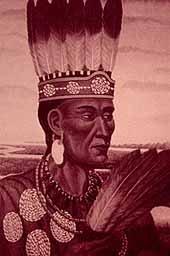
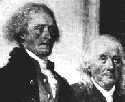 Another Stereotype of the Month entry:
Another Stereotype of the Month entry:

 Another Stereotype of the Month entry:
Another Stereotype of the Month entry:
Native Americans escaping control by U.S. government
By NEIL MUNRO, The Daily Oakland Press
Sept. 19, 2003
The Founding Fathers and other early national leaders must be turning over in their graves.
Native Americans, whom they called Indians, have managed to an amazing degree to exempt themselves from the law of the land.
Politically correct federal judges through the years have interpreted pioneer-era tribal treaties as having created a separate nation for the descendants of the people who arrived on the continent tens of thousands of years earlier.
In Michigan, it began more than 30 years ago with the federal judicial exemption of Native Americans from state laws governing fishing.
Twenty years ago, they took advantage of that precedent to expand into otherwise-illegal gambling on their reservations, which sometimes were expanded to include choice sites.
Within the past few years, the tribes condescended to make payments "in lieu of taxes" to local governments that were saddled with the additional costs of these Native American enterprises without compensation.
Now we find that Native Americans have extrapolated their special powers -- privileges outside laws that apply to people of European, African and Asian descent -- to the field of education.
An Upper Peninsula community college at a Bay Mills reservation is exercising its power to charter private schools wherever it wishes. This is beyond the limits imposed by the Michigan Legislature on other non-native institutions, such as other colleges and universities.
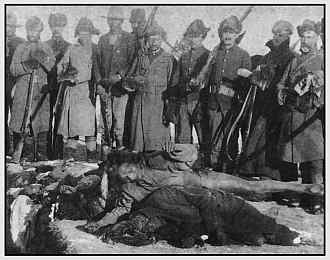
Gov. Jennifer Granholm would like to rein in the natives on that score, but it is hard to imagine the federal courts will let her get away with it.
No less a personage than Andrew Jackson warned against endowing "Indians" with special "national" rights and privileges. He said it would lead to this sort of nonsense, and he was prescient.
Jackson and Thomas Jefferson before him were among those who considered the natives inherently equal to the white settlers as people who would enjoy full citizenship when they had become acclimated to the new and dominant European culture.
No one is seriously saying the Bay Mills charter schools are a bad thing. The question is whether any group should be able to exercise extra-legal powers for any reason -- historic or otherwise. While the answer obviously is no, there seems little hope the Native Americans will ever be brought under democratic control.
What makes the phenomenon especially ominous is that membership eligibility in the various tribes basically is self-determined. Most tribes have requirements such as various claims of native ancestors, and at least one major tribe has taken eligibility on faith.
One really must blame the judges for this end run around the U.S. Constitution.
The big story is, of course, not the flouting of fishing laws or the unlimited establishment of charter schools. It is casino gambling, which has popped up in just about every state. Most casinos are Native American-based, and the ones that aren't are in states, such as Michigan, that legalized casino gambling to raise revenues.
What otherwise-illegal enterprise will next become reality while non-natives look on?
Good Morning
Steve Mariucci does not walk on water, either. N.M.
©The Oakland Press 2003
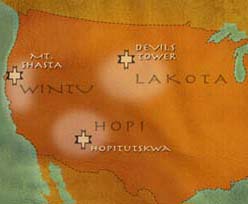
Rob's reply
Munro's many mistakes show a basic lack of understanding of Indian rights:
It's tribal governments, not individual Indians, who tend to be exempt. And they tend to be exempt mainly from state laws, not federal laws.
Just as important, Indians haven't exempted themselves. The president, Congress, and the courts have exempted them by passing laws and upholding treaties according to the Constitution. That's how the American system works; it's called democracy.
>> Politically correct federal judges through the years have interpreted pioneer-era tribal treaties as having created a separate nation for the descendants of the people who arrived on the continent tens of thousands of years earlier. <<
Federal judges have been establishing the sovereignty of Native nations since the Marshall trilogy of decisions in the 1820s and 1830s. In other words, pioneer-era judges made pioneer-era decisions based on pioneer-era treaties. If the phony "political correctness" ever existed, it didn't exist then.
These decisions didn't create Native sovereignty, they recognized it. The Founders recognized Native sovereignty by the way they worded the Constitution. See The Facts About Tribal Sovereignty for more information.
>> Now we find that Native Americans have extrapolated their special powers -- privileges outside laws that apply to people of European, African and Asian descent -- to the field of education. <<
The so-called privileges apply to people of European, African and Asian descent if they're members of Indian tribes. Membership is a political decision, not a racial decision. Tribes often grant membership to people who have more non-Indian than Indian "blood."
>> No less a personage than Andrew Jackson warned against endowing "Indians" with special "national" rights and privileges. He said it would lead to this sort of nonsense, and he was prescient. <<
Jackson was a genocidal thug and tyrant. See Andrew Jackson for more information.
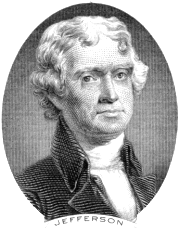
>> Jackson and Thomas Jefferson before him were among those who considered the natives inherently equal to the white settlers as people who would enjoy full citizenship when they had become acclimated to the new and dominant European culture. <<
See The Slave-Owning Sage of Monticello for Jefferson's real views on Indians. As for what he thought of Andrew Jackson: "I feel much alarmed at the prospect of seeing General Jackson President. He is one of the most unfit men I know for such a place."—Thomas Jefferson, 1824.
I'd love to see a statement by Jefferson or Jackson advocating "full citizenship" for Indians. I don't think such a statement exists.
The government's plan wasn't to let the Indians "become acclimated." It was to destory their lives and cultures until they had no choice but to surrender their identities and assimilate into nonexistence.
>> The question is whether any group should be able to exercise extra-legal powers for any reason -- historic or otherwise. <<
The question is whether powers enshrined in the Constitution can ever be "extra-legal."
>> What makes the phenomenon especially ominous is that membership eligibility in the various tribes basically is self-determined. <<
That's basically true, but is it omnious? I thought every conservative's goal was to escape government control and enrich oneself in a tax-free environment. Munro should be hoping that Indian tribes enroll every person in the United States, since it would effectively end the present system.
If tribes are seeking money or power, as Munro implies, they have every reason to limit membership, not expand it. And most battles on this issue are between tribes that want to restrict their present membership vs. disenfranchised groups that want to join them. No tribe that I know of is actively seeking new members to dilute its financial or cultural strength.
>> One really must blame the judges for this end run around the U.S. Constitution. <<
Yes, darn that Chief Justice Marshall and his politically correct view of Indian sovereignty. How dare he interpret Article I, Section 8 of the Constitution—that Congress has the power "to regulate commerce with foreign nations, and among the several states, and with the Indian tribes"—as equating Indian tribes with foreign nations and the several states?
From Fundamental Principles of Tribal Sovereignty:
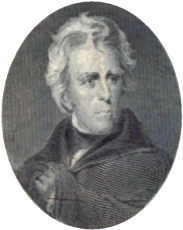
The three cases which are known as the Marshall Trilogy are Johnson v. McIntosh (1823); Cherokee Nation v. Georgia (1831); and Worcester v. Georgia (1832). In Johnson v. McIntosh (1823) the Supreme Court concluded that tribal sovereignty, although impaired by European colonization, cannot be dismissed.
Supreme Court Chief Justice Marshall stated, "In the establishment of these relations [between Europeans and Indians], the rights of the original inhabitants, were in no instance, entirely disregarded. They were admitted to be the rightful occupants of the soil, with the legal as well as just claim to retain possession of it, and to use it according to their own discretion" (Getches, Wilkinson, and Williams, Jr. 1993, 144).
Cherokee Nation v. Georgia (1831) ruled that Indian tribes were "a distinct political society, separated from others, capable of managing [their] own affairs and governing [themselves]" (Getches et al. 1979, 162).
Related links
The facts about tribal sovereignty
The facts about Indian gaming
Too-powerful Indians
Greedy Indians
|
. . . |

|
All material © copyright its original owners, except where noted.
Original text and pictures © copyright 2007 by Robert Schmidt.
Copyrighted material is posted under the Fair Use provision of the Copyright Act,
which allows copying for nonprofit educational uses including criticism and commentary.
Comments sent to the publisher become the property of Blue Corn Comics
and may be used in other postings without permission.